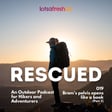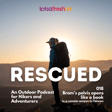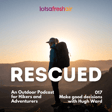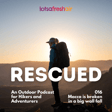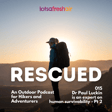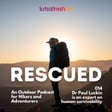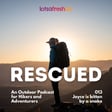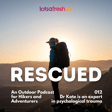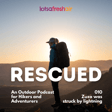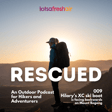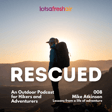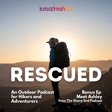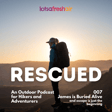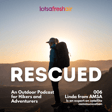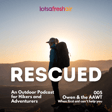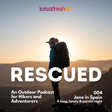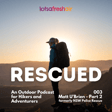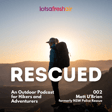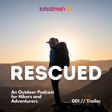
011 // Andy needed rescue on the K2K (Kanangra to Katoomba)
My guest today has a long history of working and playing in some of the most rugged and remote parts of NSW. So, with a few days up his sleeve, a bit of research and the right kind of skills and experience behind him, he set off for another steep n’ deep trip through Kanangra Boyd National Park, bound for Katoomba on the traditional K2K route.
WARNING: The K2K route is described online as a classic 3 day trip in the southern Blue Mountains. This description was written before the fires and floods since 2019. It cannot be compared with other walks of a similar length such as the Six Foot Track, which is on well-defined management and fire trails. The K2K has always been a challenging walk that pushes the Australian Walking Track Grading System of 1-5, into an unofficial 6. That was then (before the fires) and now, it's an even more punishing route.
I've written about this route before with this rescue of Chini who shared her written story.
Heraclitus was a Greek philosopher, born around 500 BC. Now, I’m wondering if he was a bit of a bushwalker and a lover of nature, cos he’s the one who said, “No man ever steps in the same river twice. For it's not the same river and he's not the same man.”
He’s also the one credited with saying, “the only constant is change.”
Nowhere is this more evident than in nature: The turning of the seasons, the changes this brings in life cycles of plants and animals, erosion from weather, climate change, bushfires, my greying hair, you name it.
And for those of us who love being out on (or off) the track, it’s something that feels more obvious in recent years: there’s more people, more bushfires, weather events and landslides are changing the landscapes that we love to spend time in.
Learnings from this episode:
- Having a Personal Locator Beacon (PLB) as a critical part of your packing.
- The importance of having a 'place to go' within yourself (eg. meditation, mindfulness, faith, etc) when faced with a crisis, helping you remain calm and make wise decisions.
- The value of having past experience in similar terrain you expect to encounter.
- Just because a track is marked online or on apps, doesn't meant it exists in the landscape. Other than the official land manager apps (eg: NPWS App) data can be out of date and user reviews or descriptions extremely subjective. Apps like AllTrails, etc should be used in conjunction with other research and navigation skills.
- If it's been a while between longer or hard walks, consider your overall health from other factors.
Helpful Links:
- Episode 6 - PLBs and other satellite communication devices // My interview with Linda Berriman from AMSA (the AU govt agency responsible for rescues in Australia)
- Creatine Kinase (CK) testing
